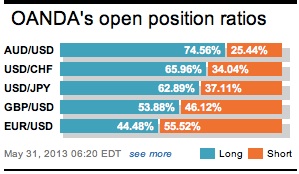The forex month-end re-balancing requirements sometimes have a habit of creating market price anomalies that can never be explained, no matter how much technical or fundamental analysis is thrown at the gyrating price movements. Occasionally, the best advice is as simple as ‘to not get involved’ in any month-end or quarter-end battles that ensue. By walking away one can avoid most of the consuming emotion plays that have a habit of first, ruining your weekend, and second, has one suffering in silence replaying the erratic price moves that just cannot be understood. All of this is easier said than done, traders require volatility and stepping aside from a moving market is not a natural inclination.

Japanese equities have managed to post their first monthly fall in 12-months and this despite a small rally to end the month earlier this morning. Globally, the month of May has seen a massive shift in funds as investors contemplated the possibility that ‘helicopter’ Ben Bernanke and his cohorts might begin ‘rolling back’ or taper their current QE3 program. Even in the land of the ‘rising sun,’ this week’s massive volatility had investors raising questions over PM Abe’s QE easing program for his country’s economic recovery. The huge volatility swings in various asset classes in Japan this week has been at the core of the general unease in the Asian markets. After nine-months of consecutive gains and despite some multiple daily losses in excessive of -5% this week, the Nikkei happened to post only a -0.6% loss on the month.
So far in Europe the equity indices have been tracking lower after the release of some uninspiring data that has happened to weigh on the 17-member single currency, allowing risk-off trading strategies to dominate that session. Retail sales in the powerhouse of Europe, Germany, declined for a third consecutive month in April (-0.4%, m/m), while one of Chancellor’s Merkel’s strongest allies, France, recorded another month-over-month of consumer spending declines (-0.4%). Albeit all-important data, Euro regional unemployment reports are sure to provide most of the market movement impetus.
After the IMF recalibrated some of the bigger economies growth objectives for this year, employment and unemployment numbers probably run a close second best of market importance this week. The numbers being released in Europe are managing to hit new fresh records with a disturbing age distribution, certainly a sign that the three-years of austerity policies is clearly not working. Unemployment in the 17 countries’ that share the EUR rose to another fresh record high in April (+12.2% or +19.38-million), while price inflation remained subdued in May (+1.4% – a global phenomena), a cocktail mixture that should pressure the ECB to focus on policies to boost growth, similar to the Fed’s, while easing austerity measures. More importantly, the region’s youth bear the brunt of job cuts.

The rate of unemployment amongst individuals 25-years and younger is +24.4%. This is a vicious circle – higher unemployment suggests ongoing muted consumer demand for most goods and services and with global growth cuts there is an increasing reluctance for firms to hire individuals. Voila, no jobs for the youth! Regionally saw the number of jobless people in France hit a fresh high of over +3.2-million last month. While in Italy, it’s jobless rate reached a 36-year high as companies did not hire staff amid pessimism about the outlook of an economy that’s probably in its eighth quarter of recession. Their joblessness rose to +12% after the March reading was revised up to +11.9% from an initial +11.5%.
Emerging market assets have benefited from huge capital inflows over recent years, not because they were enticed by specific fundamentals but because they were pushed out of the G3 asset blocs by their Central Banks policies – the Fed QE3 policy program being a prime example. This week the market has been left with a bad aftertaste as the tidal wave of these initial “inflows” are beginning to be reversed. By following the asset flows is capable of giving some of us a heads up of further things to come.
The ‘mighty’ dollar continues to slam the emerging markets because of its spreads. The rise is US treasury yields (the benchmark 10’s this month moved from +1.61% to +2.23%) has been allowed to drive the dollar higher against most of its competing rivals. The move cannot be described as a typical “risk-off” trade, instead the emerging or rival selloff could be best described as a “structural shift resulting from dollar strength, less commodity demand and slowing growth in emerging economies broadly.” However, because of the day that is in it, month-end, there is certainly a bit of noise that cannot be explained away. Next week cannot be expected to be any different with an ECB announcement and NFP report to digest.

While the market continues to be divided on Fed’s QE3 policy, this uncertainty should have market participants expecting another volatile trading day, in particular when the US PCE deflator will be published. Analysts expect the headline PCE price index to be down -0.2% on the month due to lower gas prices, while the core should be flat. A softer reading might take some “wind out of the dollar’s sails” as yields fall – all temporary for sure.

Other Links:
EUR Bears Prefer To Remain Quiet
Dean Popplewell, Director of Currency Analysis and Research @ OANDA MarketPulseFX
This article is for general information purposes only. It is not investment advice or a solution to buy or sell securities. Opinions are the authors; not necessarily that of OANDA Corporation or any of its affiliates, subsidiaries, officers or directors. Leveraged trading is high risk and not suitable for all. You could lose all of your deposited funds.



